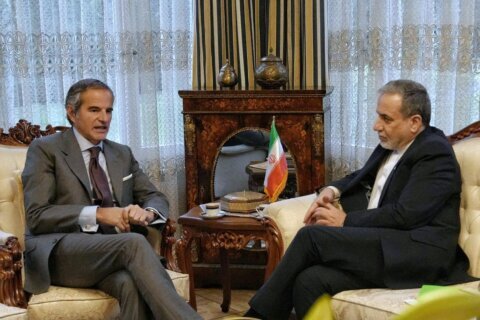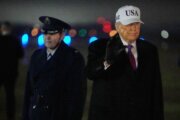Editor’s Note: In the last four years, WTOP National Security Correspondent J.J. Green has tracked the threats, policies and vulnerabilities dominating national security in the U.S. and beyond. Read more here about what went into this series.
***************************
Part 2: The shifting of the guard
J.J. Green, wtop.com
WASHINGTON – Retired Marine Corps Gen. James Jones, President Barack Obama’s first national security adviser, chuckled as he revealed a private joke within the National Security Council.
“For all of the (Cabinet) secretaries in the inter-agency, we encouraged them to be at the meetings, and the line I liked to use was, ‘If you’re not at the table you’re on the menu,'” Jones said.
But the shift change from former President George W. Bush’s team to the Obama national security team was no laughing matter. Jones, the person in charge of shaping the new national security team, knew the nation was facing a heavy lift.
“Winding up the war in Iraq, handling the war in Afghanistan, emerging problems with Pakistan, trying to reset various relationships around the world – notably with the Russians, the developing Chinese relationship – were our main concerns,” Jones said.
He said Obama “charged him with making sure that anybody who had equities on an issue was at the table.”
Already crowded, the table became more so early on.
“I think the very first thing we really did that was consequential was to combine the National Security Council and the Homeland Security Council into one national security staff,” Jones said.
As the Obama National Security team settled into place in late January 2009, a lot of unfinished business awaited them even as they waded into the uncharted, rapidly changing world of global security.
In an exclusive interview with WTOP in early 2012, reflecting on the years 2009 to 2011, Jones said, “Under President Obama, who spends a lot of time discussing and pulling the hard issues and asking tough questions, it was important to organize the National Security Council to reflect the world that is, not the world that was.”
That shift, according to Jones, was designed to “flatten the organization” so that the issues were discussed from the bottom up and not from the top down.
That meant more people had a voice on issues than was typical for the NSC, but Jones said they were necessary to coordinate a national response on the tough issues facing the U.S.
It wouldn’t be long before their harmony would be tested. The first trial was a flu pandemic that began to sweep the nation in April 2009.
One year later, the U.S. Centers for Disease Control and Prevention (CDC) estimated that about 59 million Americans contracted the H1N1 virus, 265,000 were hospitalized as a result and 12,000 died.
In addition to two foreign wars, al-Qaida threatening to attack at any moment and a flu contagion racing across the nation, the country was in the midst of an economic downturn that forced corporate giants to accept federal bailouts just to stay afloat.
Jones said it was imperative to recognize that shifting to a new national security strategy meant “understanding that national security in this new century was more of a whole of government approach that economics played a part in it.”
“The National Security Council did some work on the Free Trade Agreement and on export control reforms to help American business compete more agilely overseas,” Jones said.
But that wasn’t enough.
The importance of a strong American economy or lack thereof has emerged recently in the ongoing budget sequestration process which mandates cuts to the federal budget. Unless Congress acts to delay or repeal a mandated $1.2 trillion federal deficit-reduction measure by January, the Pentagon will be forced to cut about $500 billion in spending. That will have a direct impact on the U.S. national security posture.
Back in 2010, there were allegations that then-Director of National Intelligence Dennis Blair and then-CIA Director Leon Panetta were at odds. Questions about infighting and bickering lingered. Some called it robust debate. Blair was fired in May and about a month later, International Security Assistance Force commander Gen. Stanley McChrystal was sacked after making remarks critical of Vice President Joe Biden.
As difficult as that year seemed, it was a breeze compared to the fireworks in 2011. Even before the year started, the shift change continued. Jones resigned, prompting deep concern about the nation’s security. The move left many wondering why a four-star general, with 40 years of national security experience, was leaving.
NEXT: Keeping up appearances
Follow J.J. Green and WTOP on Twitter.
(Copyright 2012 by WTOP. All Rights Reserved.)







